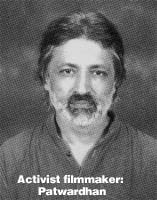Battling the bomb
Anand Patwardhan's latest documentary, War and Peace,
explores the terrifying India-Pakistan nuclear standoff
by MATTHEW HAYS
 Documentary filmmaker Anand Patwardhan has consistently created fascinating and thought-provoking movies during his 20-year-plus career. With Bombay, Our City (1985), he examined the demolition of some urban slums which led to more homelessness in his native India. In Father, Son and Holy War (1994), he looked at the deep religious divisions dividing many Indians, and the extensive and far-reaching ramifications of these divisions.
Documentary filmmaker Anand Patwardhan has consistently created fascinating and thought-provoking movies during his 20-year-plus career. With Bombay, Our City (1985), he examined the demolition of some urban slums which led to more homelessness in his native India. In Father, Son and Holy War (1994), he looked at the deep religious divisions dividing many Indians, and the extensive and far-reaching ramifications of these divisions.
The director has a Montreal connection. He completed his Masters degree in Communications at McGill in ’82. In ’81, he made the marvellous doc about immigrant workers who became union activists in the NFB film A Time to Rise. In discussing his work, Patwardhan has joked that he’s “a non-serious human being forced by circumstance to make serious films.”
This week, Patwardhan will present his latest film as a work-in-progress in Montreal, and the topic he’s chosen couldn’t be more timely. With War and Peace, the filmmaker looks closely at the tense India-Pakistan nuclear standoff, interviewing those who’ve suffered as a result of radioactive pollution and members of the nations’ small but growing anti-nuclear movement.
Radiating civilians
A longtime activist himself–he protested the Vietnam War while a student in America and volunteered for Cesar Chavez’s United Farmworker’s Union–Patwardhan makes no illusions about where he stands on this issue. He says the most startling thing he discovered while researching and making War and Peace was that “every nuclear nation has inflicted lethal radiation on civilians and all Uranium mining is done on lands occupied by indigenous people.” In particular, his film looks at the Uranium mine in Jadugoda, India, where both workers and nearby residents are seriously threatened.
Patwardhan’s examination of the nuclear standoff did give him reason for great concern. Yes, the filmmaker does see a nuclear exchange between the two nations–who’ve fought on several occasions over the disputed Kashmir region–as a distinct possibility. “Especially, accidental nuclear war is always a great fear as both countries will have no reaction time to investigate any possible attack and could launch on warning.”
Patwardhan says he does see the economic situation facing most Indians and Pakistanis as being a factor in their “nuclear pride.” “Temporarily, nukes were a panacea against the general feeling of deprivation,” but adds of the wealthiest nation on earth, “What is America’s excuse?”
M.A.D. is mad
Patwardhan also says that 9/11 should serve as a warning to those who have invested faith in mutually assured nuclear destruction. “For those who think about it, Sept. 11was proof that the most sophisticated weapons in the world cannot save you from disaster and thus was a direct blow to the rationale that stockpiling nuclear weapons is a deterrence. The best security is to build friendship across the world, to desist from arms production and sales. If the Americans, who export close to 50 per cent of the world’s arms, do not learn this lesson, we’re all in trouble.”
It is a dire prospect. Does Patwardhan see any possibility for India and Pakistan to de-nuclearize, as Nelson Mandela did with South Africa’s nuclear capability?
“Realistically, it will take a huge domestic anti-nuclear movement coupled with anti-nuke movements in the U.S. and Russia and other nuclear nations, the eschewing of Star Wars, to begin a serious movement towards disarmament. But I believe we cannot wait for the other side to disarm before doing it ourselves. We must live and work by the motto ‘Disarmament begins at home.’
“But there is some reason to hope. We travelled across India and in parts of Pakistan and realized that for the most part, ‘love’ for the bomb was based on poor information and did not reflect a desire to annihilate huge populations. It has been the rhetoric of the elite who sought prestige that was the real danger, and not any inhumanity on the part of the masses.” :
As part of Moving Ideas: A Contemporary Cultural Dialogue With India, Anand Patwardhan will introduce several of his films. On Friday, Nov. 23, he will present War and Peace at7:30pm at the Hall Building. On Saturday, Nov. 24, he will present Bombay, Our City (which will screen with Salaam Bombay!) and on Sunday, Nov. 25 he will present Father, Son and Holy War (with Bombay) both screenings at 1pm at Concordia’s de Sève Cinema. Admission to all events is free.